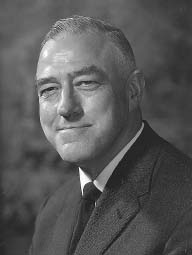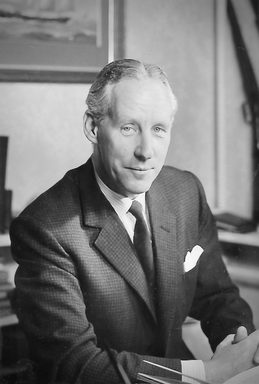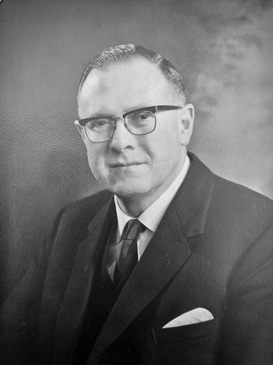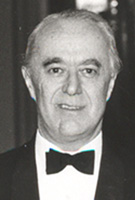
Sir Michael Francis Addison Woodruff, was an English surgeon and scientist principally remembered for his research into organ transplantation. Though born in London, Woodruff spent his youth in Australia, where he earned degrees in electrical engineering and medicine. Having completed his studies shortly after the outbreak of World War II, he joined the Australian Army Medical Corps, but was soon captured by Japanese forces and imprisoned in the Changi Prison Camp. While there, he devised an ingenious method of extracting nutrients from agricultural wastes to prevent malnutrition among his fellow POWs.

Francis John Gillingham was a British neurosurgeon.
John Anderson Strong was a Scottish physician/internist and academic, who served as Professor of Medicine at the University of Edinburgh and the President of the Royal College of Physicians of Edinburgh.
Thomas Jones Mackie CBE FRSE LLD was a noted Scottish bacteriologist; Dean of the Faculty of Medicine, University of Edinburgh; and author of medical research textbooks.

Sir James Rögnvald Learmonth (1895–1967) was a Scottish surgeon who made pioneering advances in nerve surgery.

John Oldroyd Forfar, MC, FRSE was a Scottish paediatrician and academic. He served in the Royal Army Medical Corps during the Second World War and later became a leading civilian paediatrician. He was Professor of Child Life and Health at the University of Edinburgh from 1964 to 1982. He was President of the British Paediatric Association from 1985 to 1988, and was instrumental in the founding of the Royal College of Paediatrics and Child Health.
Gertrude Marian Amalia Herzfeld was an English surgeon, one of the first female surgeons to work in Scotland and the first woman paediatric surgeon. The second female fellow of the Royal College of Surgeons Edinburgh, and the first practicing female fellow, Herzfeld chaired the Edinburgh city branch of the British Medical Association from 1960 to 1962, and was National President of the Medical Women's Federation from 1948 to 1950.
Geoffrey Duncan Chisholm, CBE, FRCS, MRCS was a New Zealand-born, British urologist. He made extensive advances in renal x-rays. He was also a strong advocate of kidney transplants, promoting the advantages of live donors.

Sir Henry Wade PRCSE FRSE DSO CMG was a Scottish military and urological surgeon. He was elected president of the Royal College of Surgeons of Edinburgh in 1935. His collection of anatomical specimens was donated to Surgeon's Hall in Edinburgh and is known as the Henry Wade Collection.

Sir John Bruce, was a Scottish surgeon who was Regius Professor of Clinical Surgery in the University of Edinburgh and President of the Royal College of Surgeons of Edinburgh.

Thomas Jaffrey McNair CBE, FRCS, FRCSEd was a Scottish surgeon who acted as editor of Emergency Surgery, one of the most widely read textbooks on the subject. Originally a general surgeon, in the latter part of his career he devoted his practice increasingly to colo-rectal surgery. He was Surgeon to the Queen in Scotland and served as president of the Royal College of Surgeons of Edinburgh.

Ronald Foote Robertson PRCPE was a 20th-century Scottish physician who served as president of the British Medical Association 1983/4 and president of the Royal College of Physicians of Edinburgh for the period 1976 to 1979. He was official Physician in Scotland to Queen Elizabeth II. He was affectionately known as Ronnie Robertson.

Sir James David Fraser, 2nd Baronet, FRCS, FRCSEd was a Scottish academic surgeon and a foundation professor at the medical school of Southampton, England, when it was established in 1969. He subsequently became Postgraduate Dean at the University of Edinburgh and served as President of the Royal College of Surgeons of Edinburgh from 1982 to 1985.

James Johnston Mason Brown OBE, FRCSEd was a Scottish paediatric surgeon. During World War II he served as a surgical specialist with the 8th Army in North Africa and Italy and was awarded the OBE for this service. As surgeon-in-chief at the Royal Hospital for Sick Children in Edinburgh, he edited the major textbook The Surgery of Childhood. He was the joint founder of the Scottish Surgical Paediatric Society and a founder member of the British Association of Paediatric Surgeons (BAPS), of which he became president. He was elected President of the Royal College of Surgeons of Edinburgh (RCSEd) in 1962 but died in office aged 56 years.
Professor Emmanuel Quaye Archampong, was a Ghanaian surgeon and academic. He was an emeritus professor of the College of Health Sciences University of Ghana Medical School, University of Ghana, Legon.

Sir Donald Macleod Douglas, was a Scottish academic surgeon. His schooling and medical undergraduate education were at St Andrews following which he embarked at an early stage on an academic career, winning a scholarship to pursue research at the Mayo Clinic, Minnesota.

Walter Quarry Wood MD, ChM, FRCSEd was a Scottish surgeon who became known as a collector of Scottish Colourists. He worked at the Royal Infirmary of Edinburgh (RIE) and was president of the Royal College of Surgeons of Edinburgh.

John William Struthers FRCSEd was a Scottish surgeon. During World War I he served as a major in the Royal Army Medical Corps and was awarded the Serbian Order of St Sava. During his career in Edinburgh he became an early user of local anaesthetic techniques in general surgery and wrote a highly regarded booklet on the topic. He was elected President of the Royal College of Surgeons of Edinburgh (RCSEd) from 1941 to 1943.
Extramural medical education in Edinburgh began over 200 years before the university medical faculty was founded in 1726 and extramural teaching continued thereafter for a further 200 years. Extramural is academic education which is conducted outside a university. In the early 16th century it was under the auspices of the Incorporation of Surgeons of Edinburgh (RCSEd) and continued after the Faculty of Medicine was established by the University of Edinburgh in 1726. Throughout the late 18th and 19th centuries the demand for extramural medical teaching increased as Edinburgh's reputation as a centre for medical education grew. Instruction was carried out by individual teachers, by groups of teachers and, by the end of the 19th century, by private medical schools in the city. Together these comprised the Edinburgh Extramural School of Medicine. From 1896 many of the schools were incorporated into the Medical School of the Royal Colleges of Edinburgh under the aegis of the RCSEd and the Royal College of Physicians of Edinburgh (RCPE) and based at Surgeons' Hall. Extramural undergraduate medical education in Edinburgh stopped in 1948 with the closure of the Royal Colleges' Medical School following the Goodenough Report which recommended that all undergraduate medical education in the UK should be carried out by universities.
Ian Fraser Muir was an English plastic surgeon at the West Middlesex Hospital and Mount Vernon Centre for Plastic Surgery. While working there he developed what became known as the 'Muir and Barclay formula' which estimates the volume of fluid replacement required in the initial resuscitation after major burns. In 1969, he relocated to Aberdeen to set up the plastic surgery and burns unit, having been appointed plastic surgeon and senior lecturer in Surgery at the University of Aberdeen. He was elected president of the British Association of Plastic Surgeons














